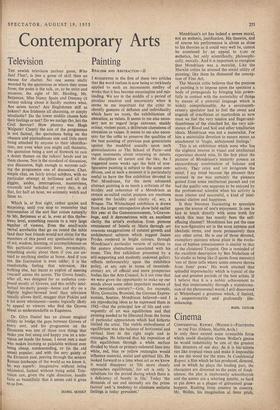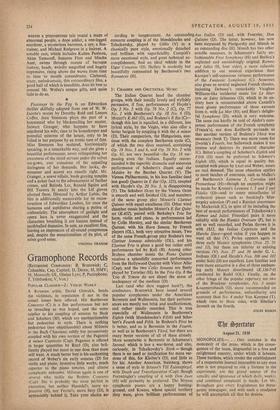Cinema
CONFIDENTIAL REPORT. (Warner.)—FOOTSTEPS IN THE FOG. (Odeon, Marble Arch.) IF only there existed some irresistible force which could discipline Orson Welles's genius he would indubitably be one of the greatest film directors of our day. As it is hist talents riot like tropical vines and make it impossible to see the wood for the trees. In Confidential Report, a film which he has produced, directed, and in which he plays the leading part, the characters arc distorted to the point of freak- ishness, the plot is exuberantly schoolboyish and the scenes are a whirling jumble, as hard to pin down as a plague of galvanised grass- hoppers. Rushing from country to country, Mr. Welles, his imagination at fever pitch,
weaves a preposterous tale round a maze of abnormal people, a dope addict, a one-legged murderer, a mysterious baroness, a spy, a flea- trainer, and Michael Redgrave in a hairnet. A notable cast, which includes Katina Paxinou, Akins Tamaroff, Suzanne Flon and Mischa Auer, swims through oceans of baroque fantasy, heads, weirdly magnified and hugely impressive, rising above the waves from time to time to mouth conundrums. Cluttered, crazy, melodramatic, this extraordinary film, a good half of which is inaudible, does its best to conceal Mr. Welles's unique gifts, and quite fails to do so.
Footsteps In the Fog is an Edwardian thriller skilfully adapted from one of W. W. Jacobs's stories by Dorothy Reid and Lenore Coffee. Jean Simmons plays the part of a housemaid who by blackmailing her master, Stewart Granger, who happens to have murdered his wife, rises to be housekeeper and potential mistress of the house, only to be foiled in her purpose by an ironic turn of fate. Miss Simmons has matured, histrionically speaking, in a remarkable way, and she gives a beautiful performance, never relinquishing her awareness of the timid servant under the velvet tea-gown, ever conscious of the appalling daringness of her demands. Her looks, de- meanour and accent are exactly right. Mr. Granger, a suave villain, lends greying temples and a poker face to the advancement of further crimes, and Belinda Lee, Ronald Squire and Bill Travers fit neatly into the kid gloves allotted them. Directed by Arthur Lubin, the film is additionally memorable for its recon- struction of Edwardian London, for once the hansoms and aspidistras sharing a patina of authenticity. The atmosphere of gaslight and opera hats is never exaggerated and the characters breathing it are human instead of mothballed dummies. In sum, an excellent film, leaving an impression of all-round competence and, despite the sensationalism of its plot, of sober good sense.
VIRGINIA GRAHAM



































 Previous page
Previous page